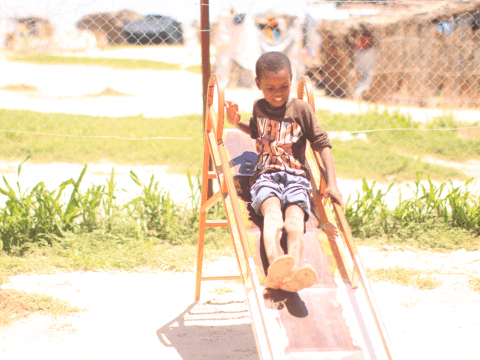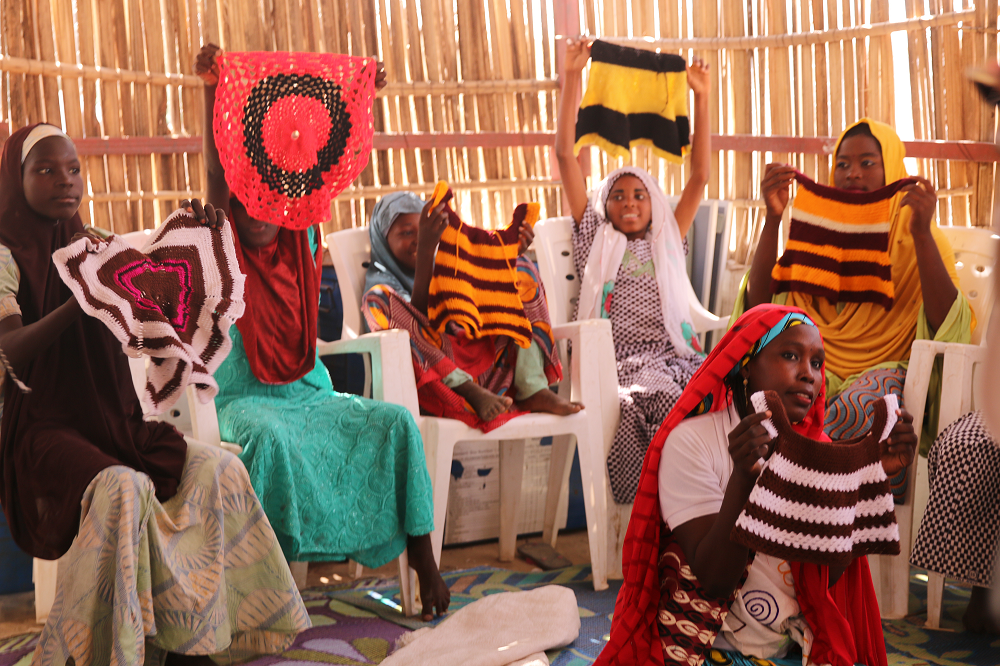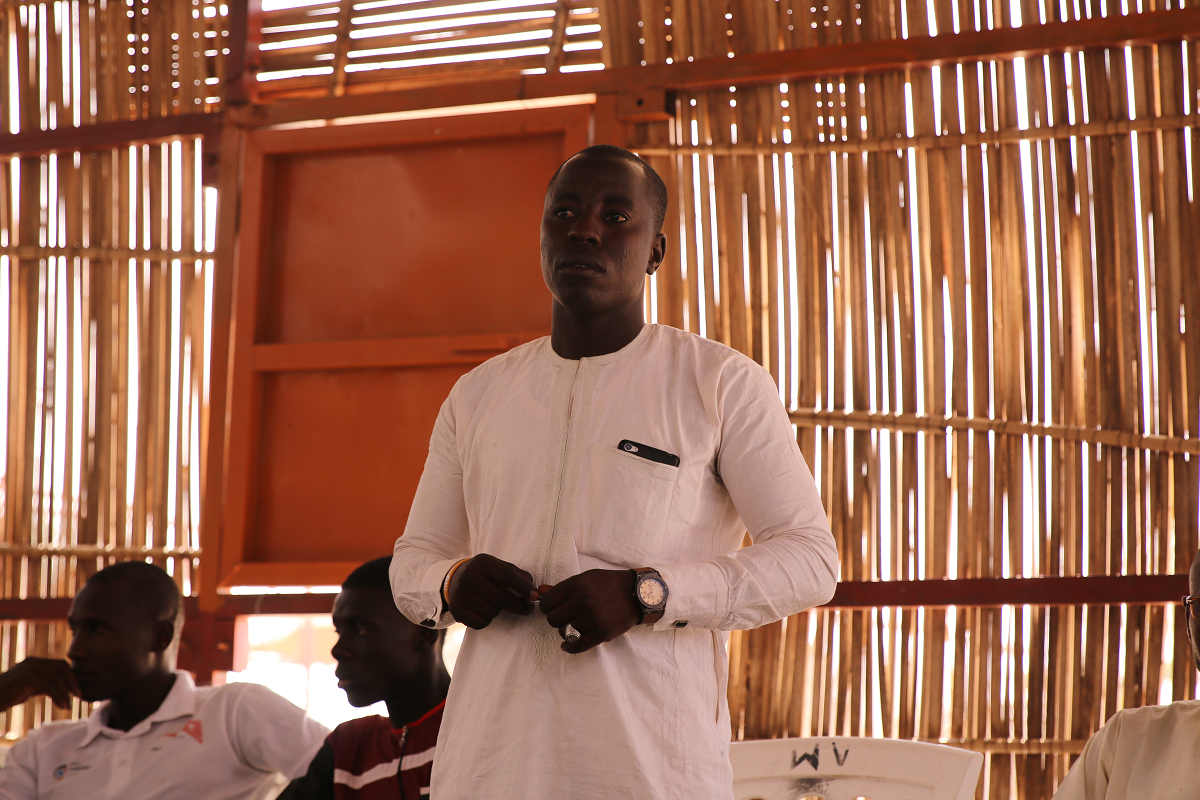Allowing Africa’s children to be children’

Written by Zena John
At this year’s Day of Prayer celebration, all World Vision staff were asked to focus on the work of colleagues in Disaster Management as they minister sacrificially with children, families and communities affected by emergencies and conflict.
Having begun my development experience in the refugee camps of Gueckedou, Guinea nearly twenty years ago, it was easy for me to remind myself of the challenges our colleagues working in emergency contexts endure. At the same time, consider the unique opportunities they have to bring love, acceptance and hope to the Most Vulnerable Children[1] (MVC) in our world.
On that same day, I made a decision to visit Diffa, the easternmost region of Niger, where we currently have a Category II Response. A three hour UN flight from Niamey, the capital city, takes you – over a distance of 1,365 kilometers to a landscape dotted with hundreds of white and blue tents filled with families who overnight have had to rebuild their lives.
Diffa faces an unprecedented security and humanitarian crisis, with 48% of the population in need of humanitarian assistance and 300, 000 displaced (Nigerian refugees and Nigerien returnees). Individuals daily battling the deadly combination of food insecurity, chronic poverty and insurgency in the Lake Chad area. Not surprisingly, the crisis is having a disproportionate impact on children and youth, who are becoming steadily more vulnerable to hunger, disease and delinquency.
A few weeks back, Niger was once classified as the 189th (last) country in UNDP’s human development index [2]. A child born in Norway today - the country with the highest human development index - can expect to live beyond the age of 82, and spend almost 18 years in school. But the same child, if born here in Niger can expect only to live to 60, with just five years of formal education[3]. These figures are sobering and underlie the need for patience and stamina considering the complexity of our context. Hope also, as one realizes that even an insignificant intervention can be life-saving in this environment.
Soon after landing, we headed for Sayam Forage camp in Chetimari Commune, Diffa Department. Housing approximately 3261 households and 14130 individuals[4], the lack of resources and increasing insecurity means that some INGOs have chosen to leave the area and focus on other, more accessible parts of the country. World Vision Niger has decided to stay for the long term.
As a result of the insurgency, children have been subjected to violence and abuse, lost their families, homes and missed out on years of education. There is one overcrowded primary school in the camp but no secondary school, excluding hundreds of children from the formal education system. UNICEF reports that more than 1 in 2 children requires humanitarian assistance, including transit care with host families[5].
World Vision, with funding from the Government of Germany and support from World Vision Germany, has been running two Child Friendly Spaces since December 2014.
Although the funding for this current phase of the project ends soon, it is hoped that World Vision Niger will be successful in subsequent funding rounds so that this very important work with children can continue.
Child Friendly Spaces are programs that support the well-being of children during emergencies[6]. They provide a safe space for children to continue to play, learn and receive psychosocial support to overcome their experiences of violence and conflict. Its primary goal is to provide the children with a structured daily routine creating trust and hope, allowing them to feel safe. In Sayam Forage, the children take part in various types of activity - sport, basic literacy and numeracy, art and knitting classes.
Talking with some of the young and courageous facilitators of the Child Friendly Spaces, the human cost behind displacement, poverty, insecurity and unemployment hits you in the face.
Take Bagana Ali, the president of one of the Child Friendly Space. An articulate, warm and bright young man from Borno state, Nigeria. Having completed his engineering studies back home in English he sees no prospect of returning to Nigeria in the foreseeable future, “we cannot go home anytime soon and must concentrate on making our lives here”, he says.
If we are serious about Our Promise 2030 and its focus on the Most Vulnerable Children, then Diffa is exactly where we need to be. We are up for the challenge.
Over the next three years, we will intensify our Gifts-in-Kind (GIK/RIK) efforts and become more intentional about extending our MVC work in Diffa. This will require a huge shift in our approach and attitudes, across all teams because we each have a role to play.
An increasing number of GIKs, for example, will require Supply Chain, Administration, Finance and Operations colleagues to be swift, pragmatic and efficient so the right goods are dispatched in a timely manner to those who need it. As Resource Acquisition and Management, we have to seek out opportunities for collaboration, build creative partnerships not only with standard ‘business as usual’ donors, but be willing to convince corporates and foundations of why they need to work with us. We are keen to engage with private individuals who want to make a meaningful, immediate difference to the lives of Niger’s children. Tailored concept notes will be shared with Support Offices, to ensure donor’s expectations are met, the right stories captured so that Diffa is no longer known as the ‘Forgotten Crisis’.
[1] Most vulnerable children are children whose quality of life and ability to fulfil their potential are most affected by extreme deprivation and violations of their rights. These children often live in catastrophic situations and relationships characterized by violence, abuse, neglect, exploitation, exclusion and discrimination.
[2] Not all countries in the world are ranked
[3] https://news.un.org/en/story/2018/09/1019362
[4] DREC juillet 2018
[5] https://www.unicef.org/wca/stories/never-leave-child-behind
[6] https://www.worldvision.org/child-protection-news-stories/child-friendly-spaces-safe-place-children

